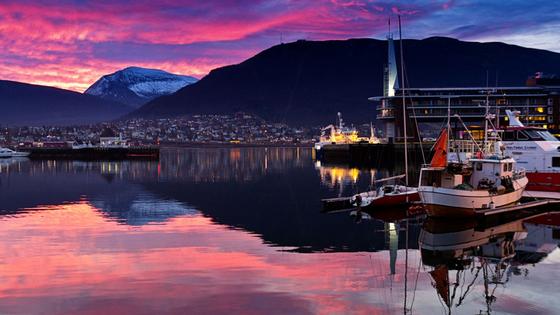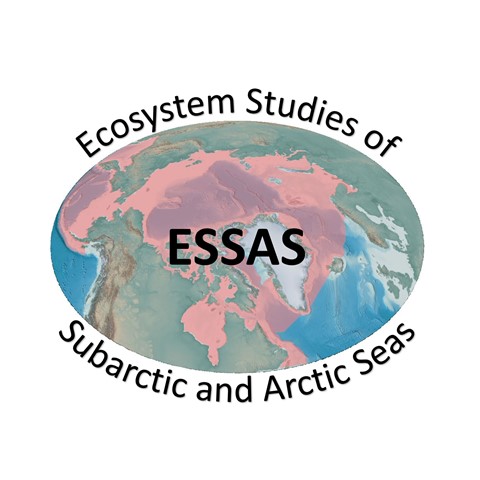
Presentations touched on all aspects of marine ecosystems and were grouped into the following sessions:
S1. Paleo-Ecology
S2. Advection and mixing and their ecosystem impacts
S3. Timing/phenology and match-mismatch: are they critical issues?
S4. Shifting habitats, persistent hot spots, and the distribution of benthos, plankton, fish, seabirds and marine mammals – observations, models, mechanisms and effects
S5. Subarctic and Arctic Marine Ecosystems under Climate Change
S6. Multiple Stressors
S7. Ocean Acidification
S8. Science, Policy and Management
S9. General Open SessionPaleo-Ecology of Subarctic and Arctic Seas (PESAS) Planning Workshop
WKS2. Climate change impacts on nearshore fish habitats in the Arctic
WKS3. Using natural analogues to investigate the effects of climate change and ocean acidification on northern ecosystems
WKS4. Arctic and sub-Arctic climate change impacts: a transdisciplinary perspectiveThe ESSAS meeting covered a wide variety of topics, documenting changes that have occurred in arctic and subarctic seas from the distant to recent past, the processes that led to these changes, and how future changes are likely to further affect these marine ecosystems. Several sessions examined the consequences of changes in Arctic marine ecosystems for people who depend upon these ecosystems and how people and communities cope with changes in the goods and services that they derive from these ecosystems. To put the present-day changes in a longer perspective, a workshop and session on the paleo-ecology of these systems examined changes in temperature and sea-ice conditions in the distant past. A special volume of the ICES Journal of Marine Science is in preparation to publish proceedings of the meeting.
S2. Advection and mixing and their ecosystem impacts
S3. Timing/phenology and match-mismatch: are they critical issues?
S4. Shifting habitats, persistent hot spots, and the distribution of benthos, plankton, fish, seabirds and marine mammals – observations, models, mechanisms and effects
S5. Subarctic and Arctic Marine Ecosystems under Climate Change
S6. Multiple Stressors
S7. Ocean Acidification
S8. Science, Policy and Management
S9. General Open SessionPaleo-Ecology of Subarctic and Arctic Seas (PESAS) Planning Workshop
Prior to the Open Science Meeting, four separate workshops were held on June 11, 2017:
WKS1. Paleo-Ecology of Subarctic and Arctic Seas (PESAS) Planning WorkshopWKS2. Climate change impacts on nearshore fish habitats in the Arctic
WKS3. Using natural analogues to investigate the effects of climate change and ocean acidification on northern ecosystems
WKS4. Arctic and sub-Arctic climate change impacts: a transdisciplinary perspectiveThe ESSAS meeting covered a wide variety of topics, documenting changes that have occurred in arctic and subarctic seas from the distant to recent past, the processes that led to these changes, and how future changes are likely to further affect these marine ecosystems. Several sessions examined the consequences of changes in Arctic marine ecosystems for people who depend upon these ecosystems and how people and communities cope with changes in the goods and services that they derive from these ecosystems. To put the present-day changes in a longer perspective, a workshop and session on the paleo-ecology of these systems examined changes in temperature and sea-ice conditions in the distant past. A special volume of the ICES Journal of Marine Science is in preparation to publish proceedings of the meeting.
Some highlights from the meeting:
- Increasing borealization is evident at the Subarctic/Arctic boundary, but appears more pronounced in the Atlantic Arctic than in the Pacific Arctic
- Subarctic and Arctic regions have experienced both gradual changes and unusual events in recent years that are most likely climate-related, including anomalous warm conditions and unusual mortality events.
- The probability of extreme or unusual events is expected to increase and disruptions of food webs, fish populations and existing fisheries associated with warm events are likely
- Inter- and trans-disciplinary approaches and training spanning the natural and social sciences is essential to understanding the impacts of these changes











